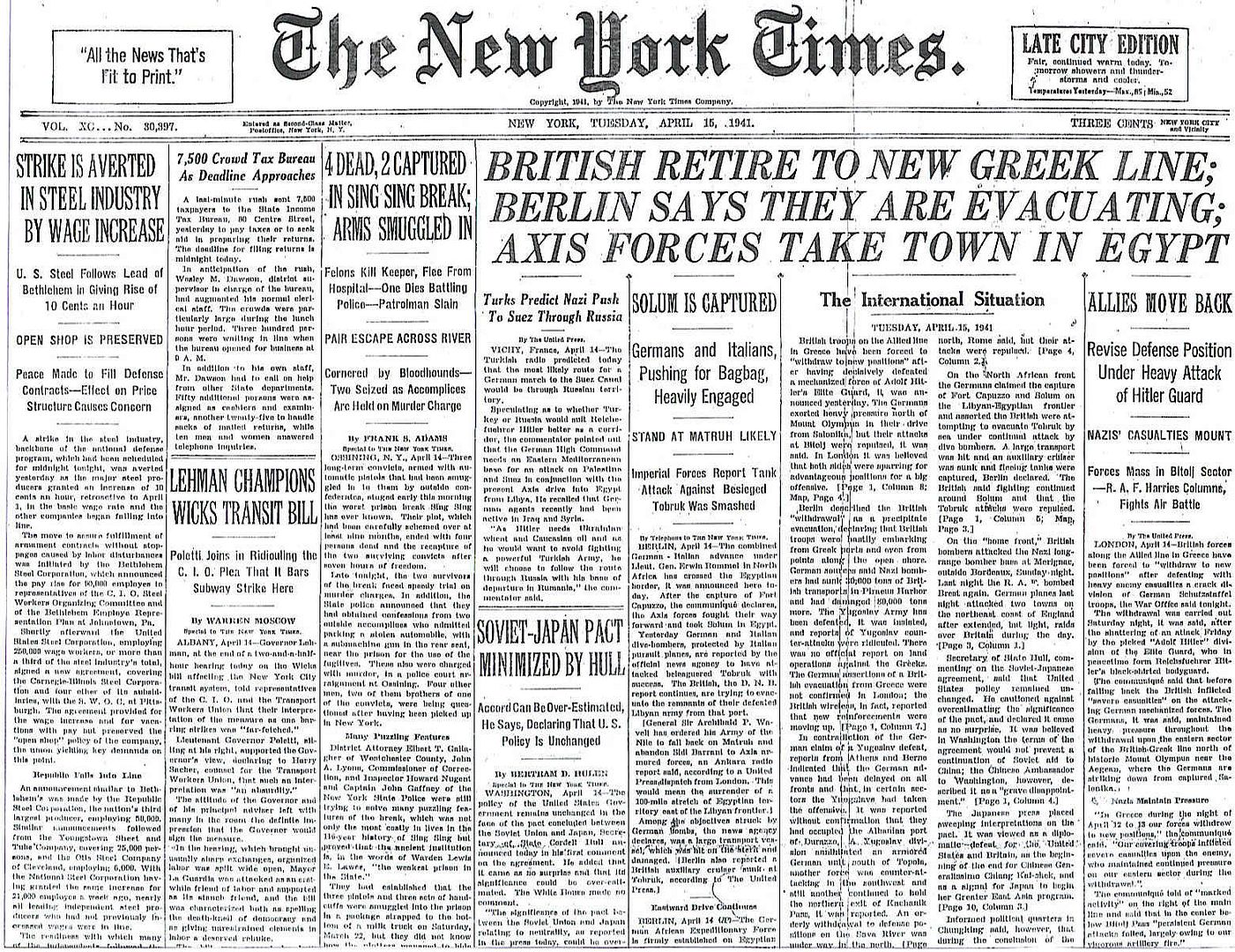
Posted on 04/15/2011 5:24:48 AM PDT by Homer_J_Simpson

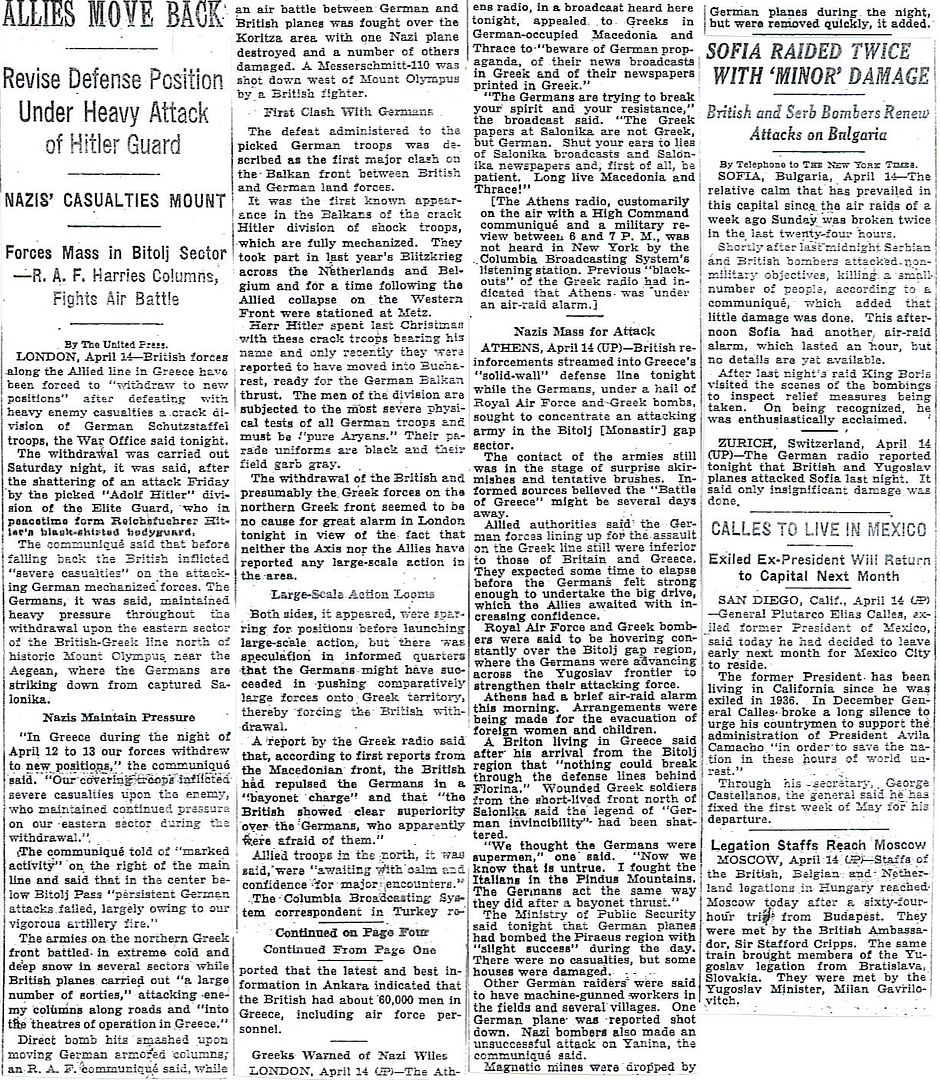
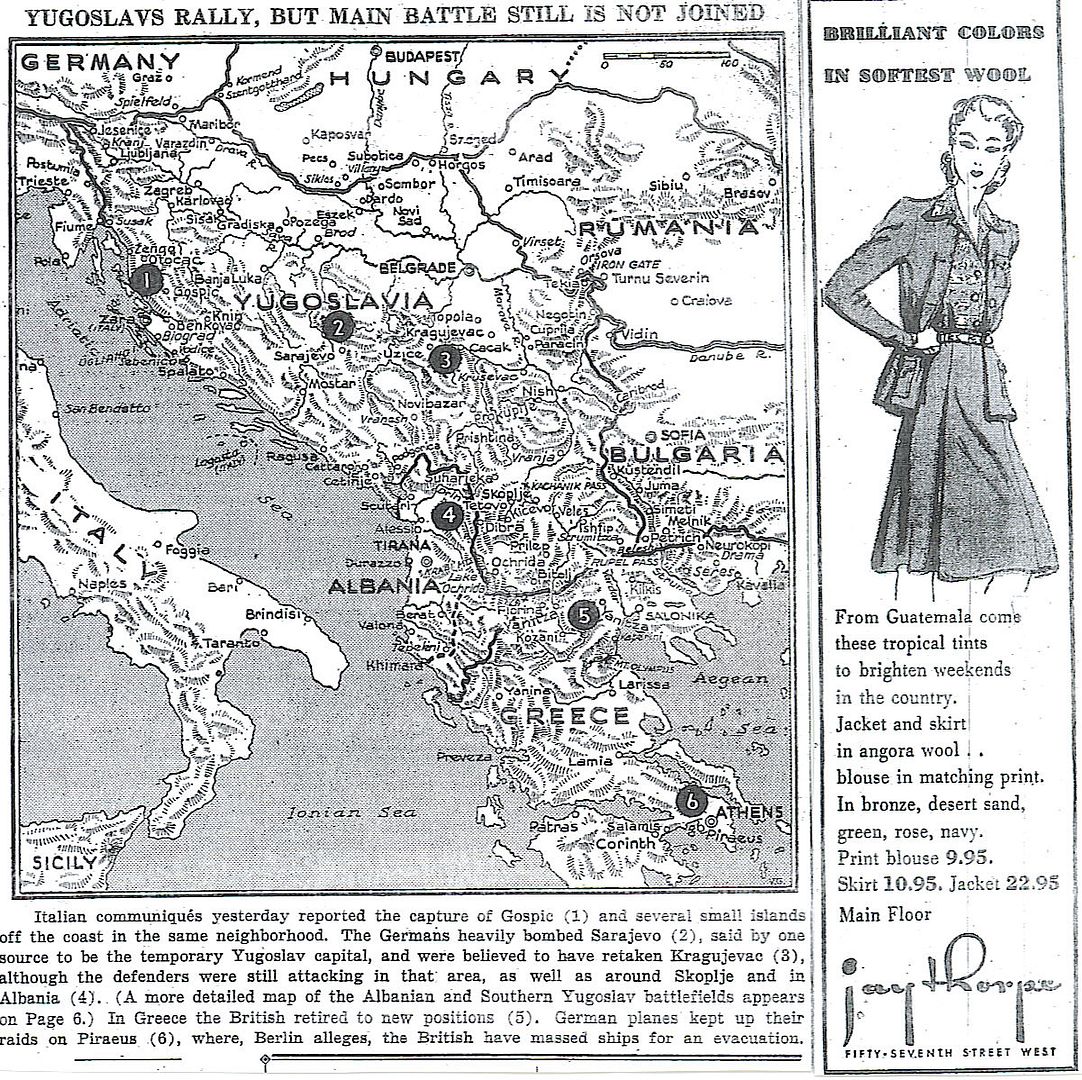
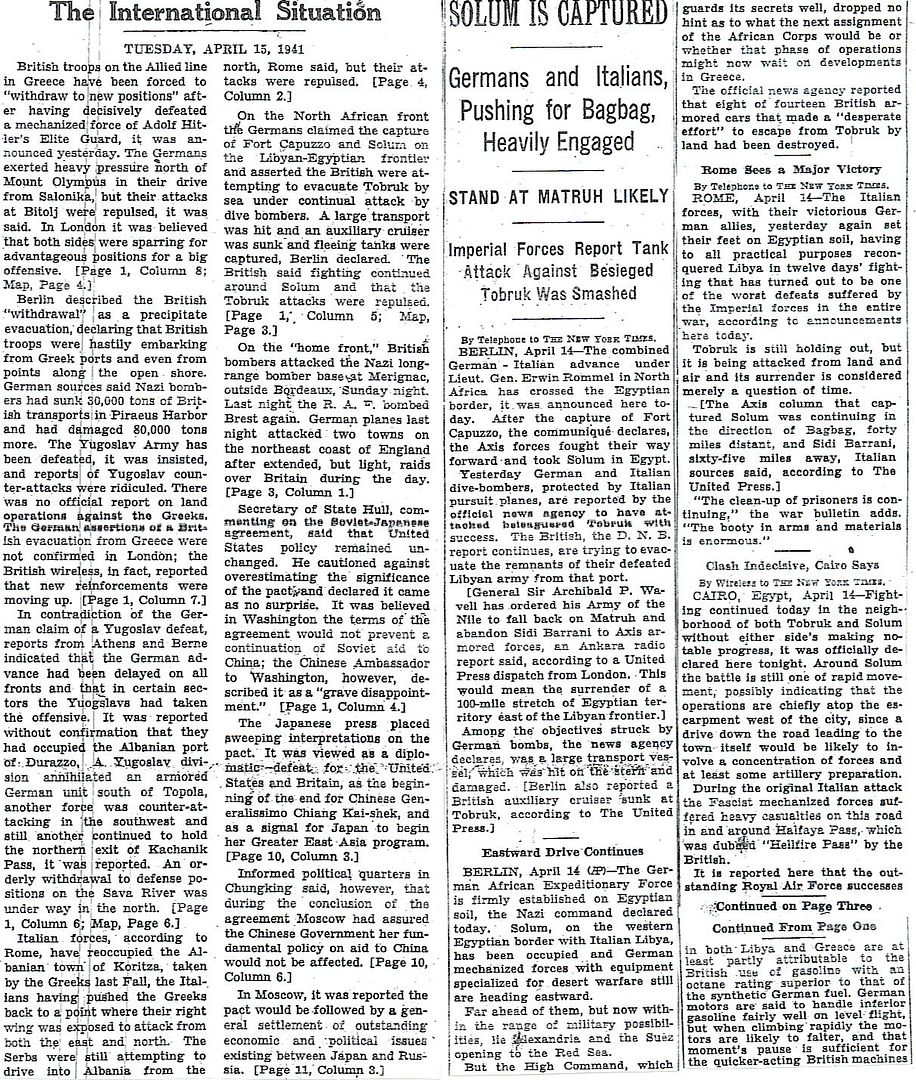
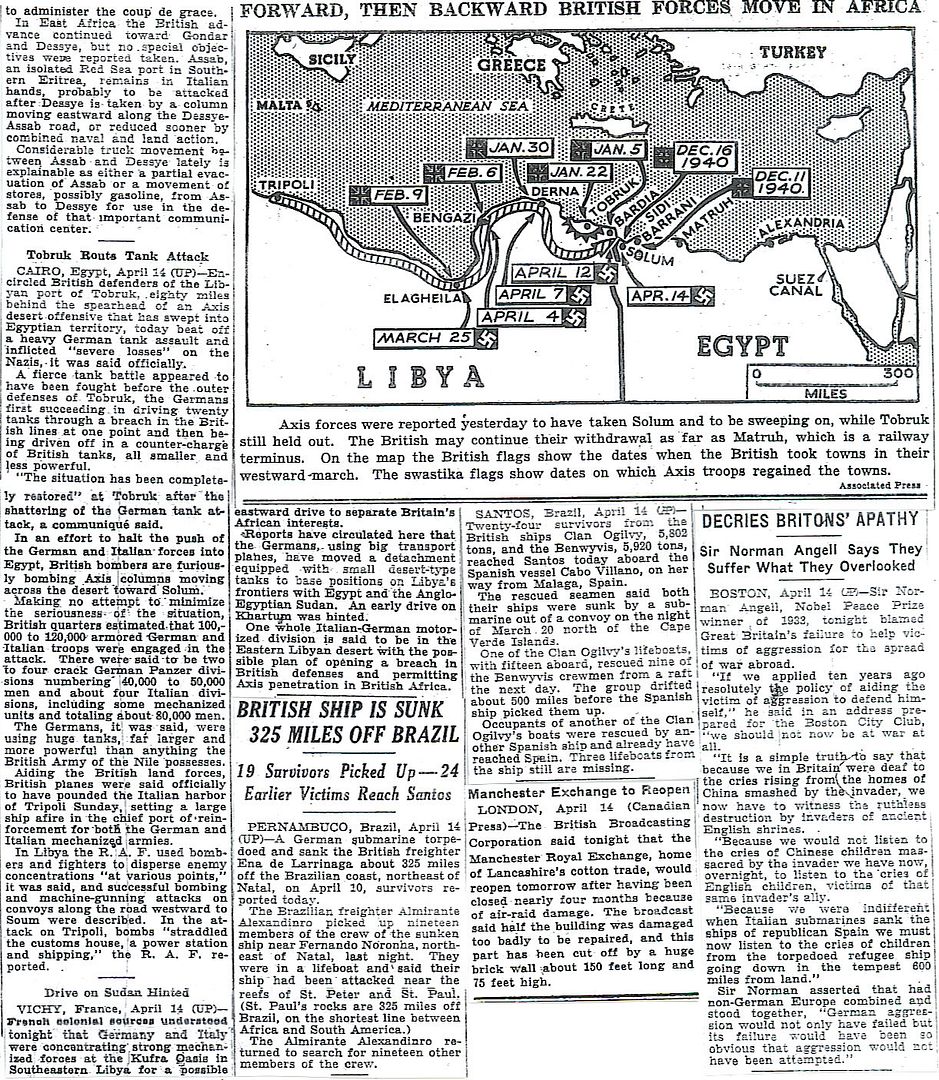
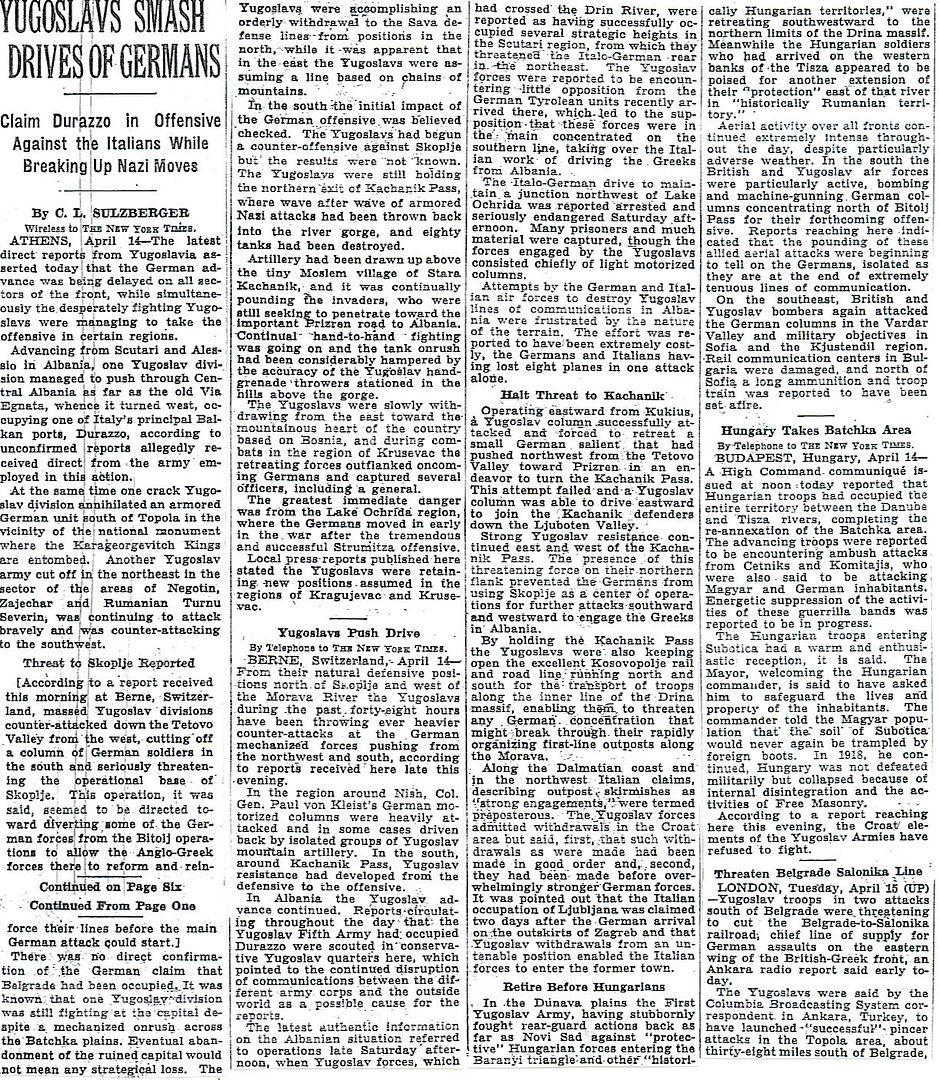
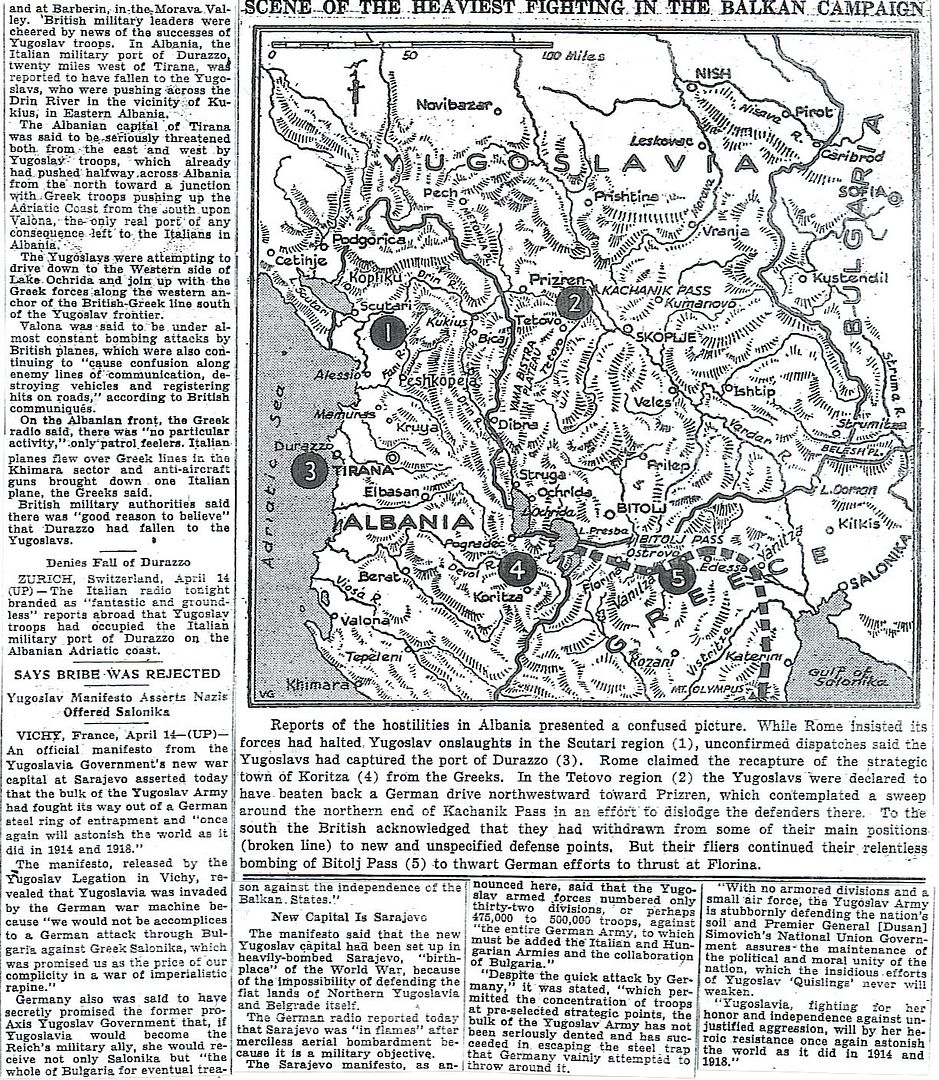
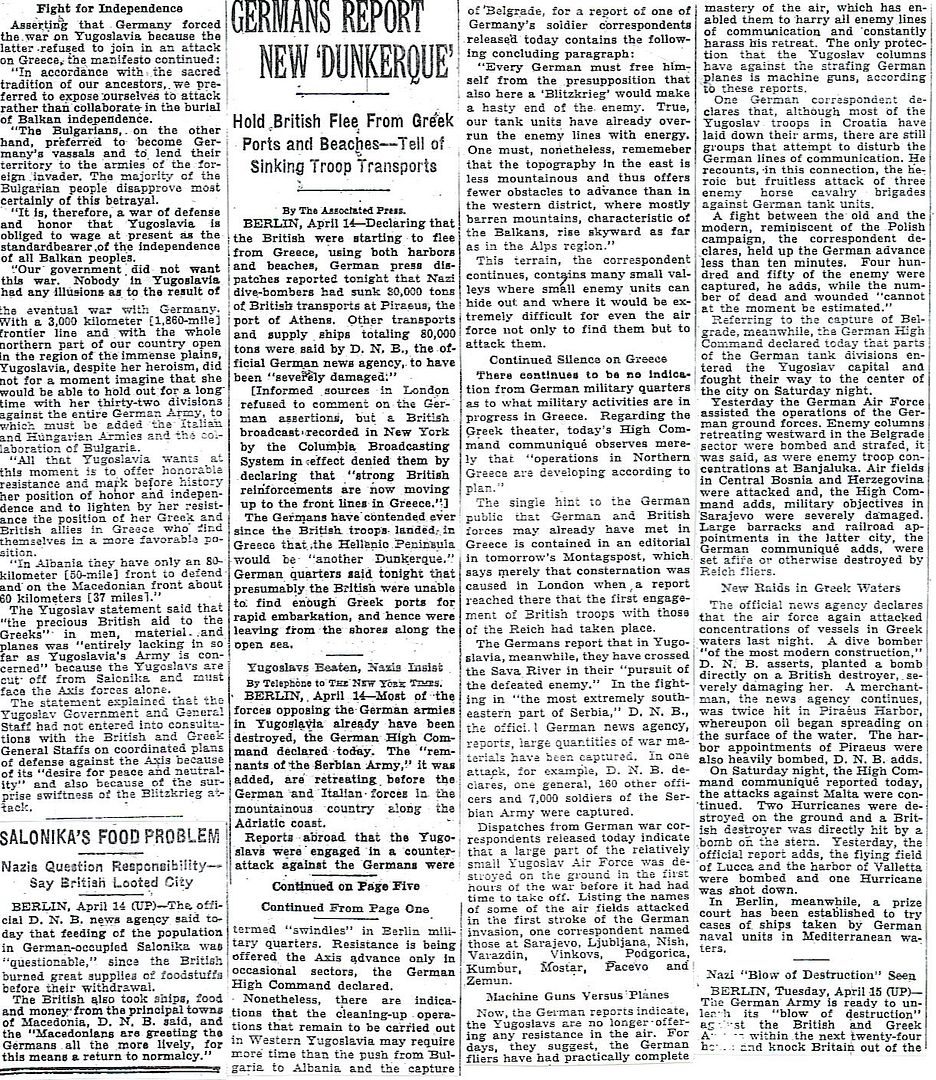
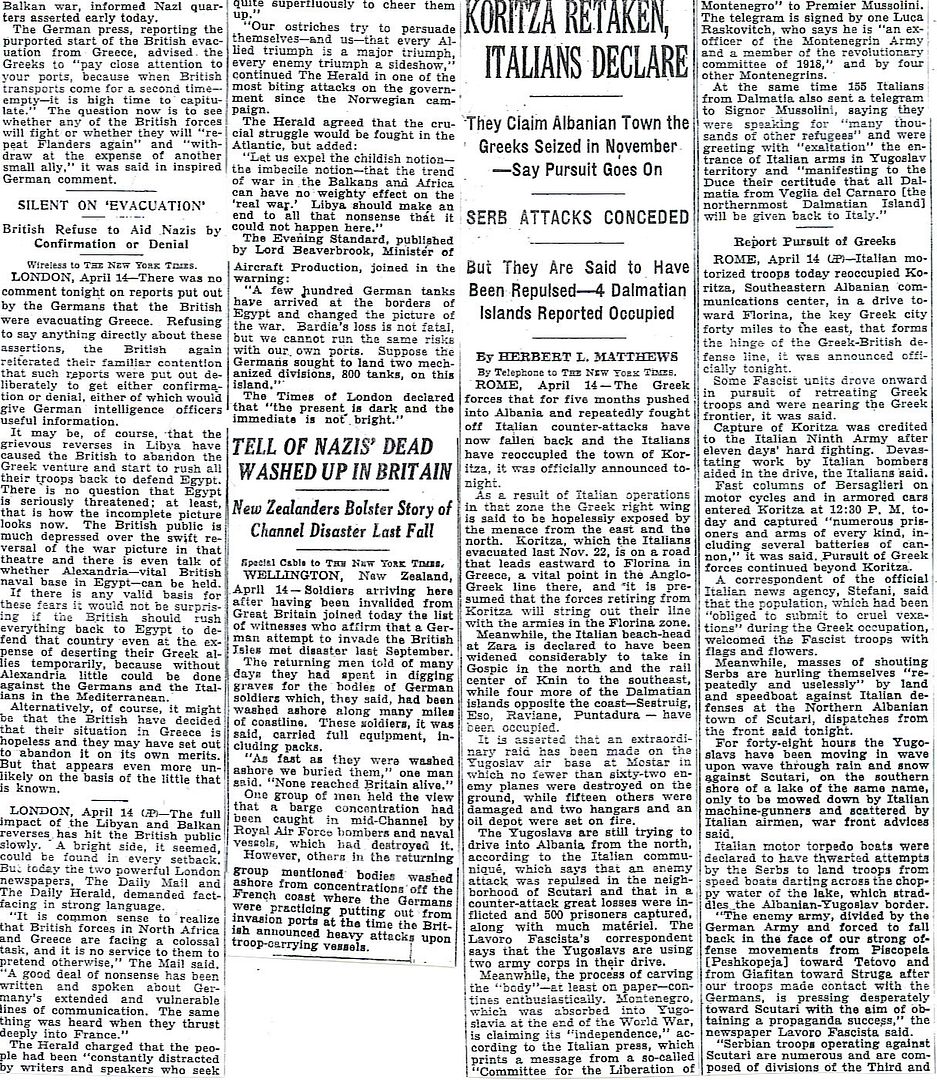
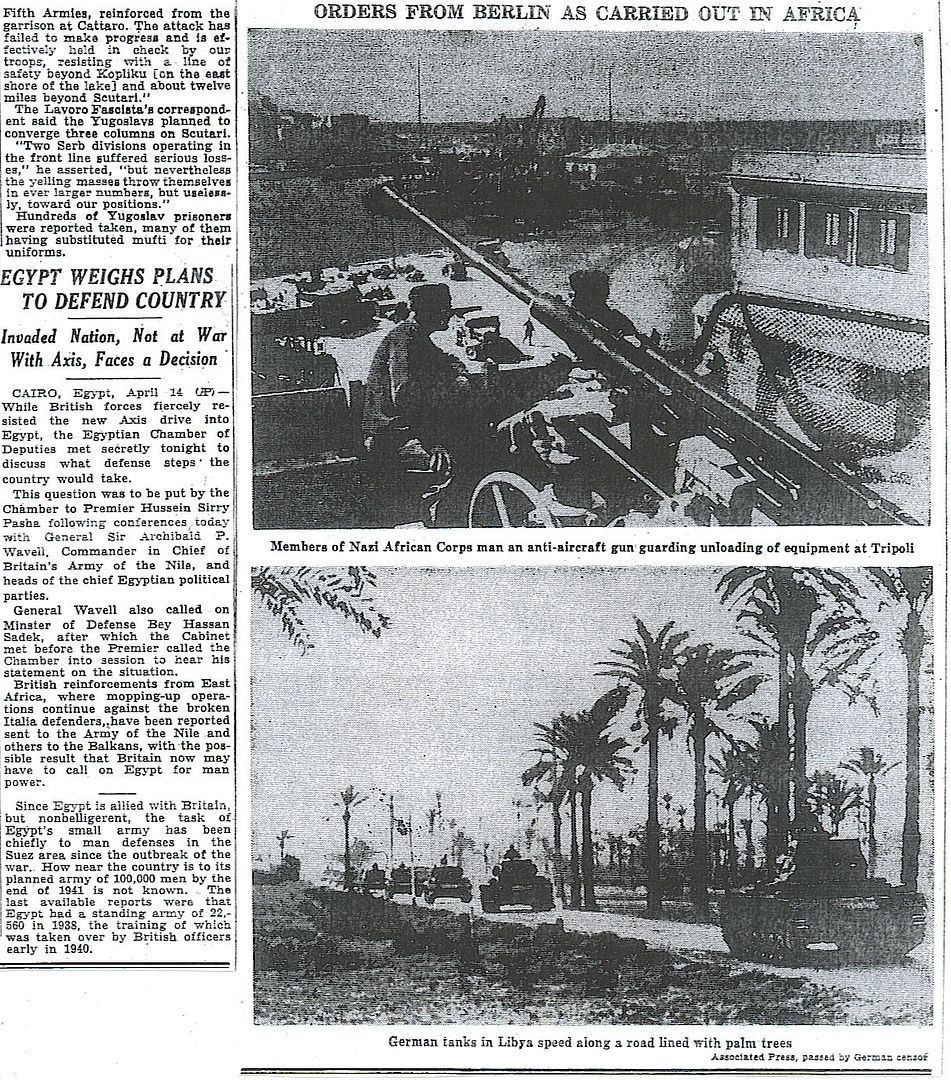
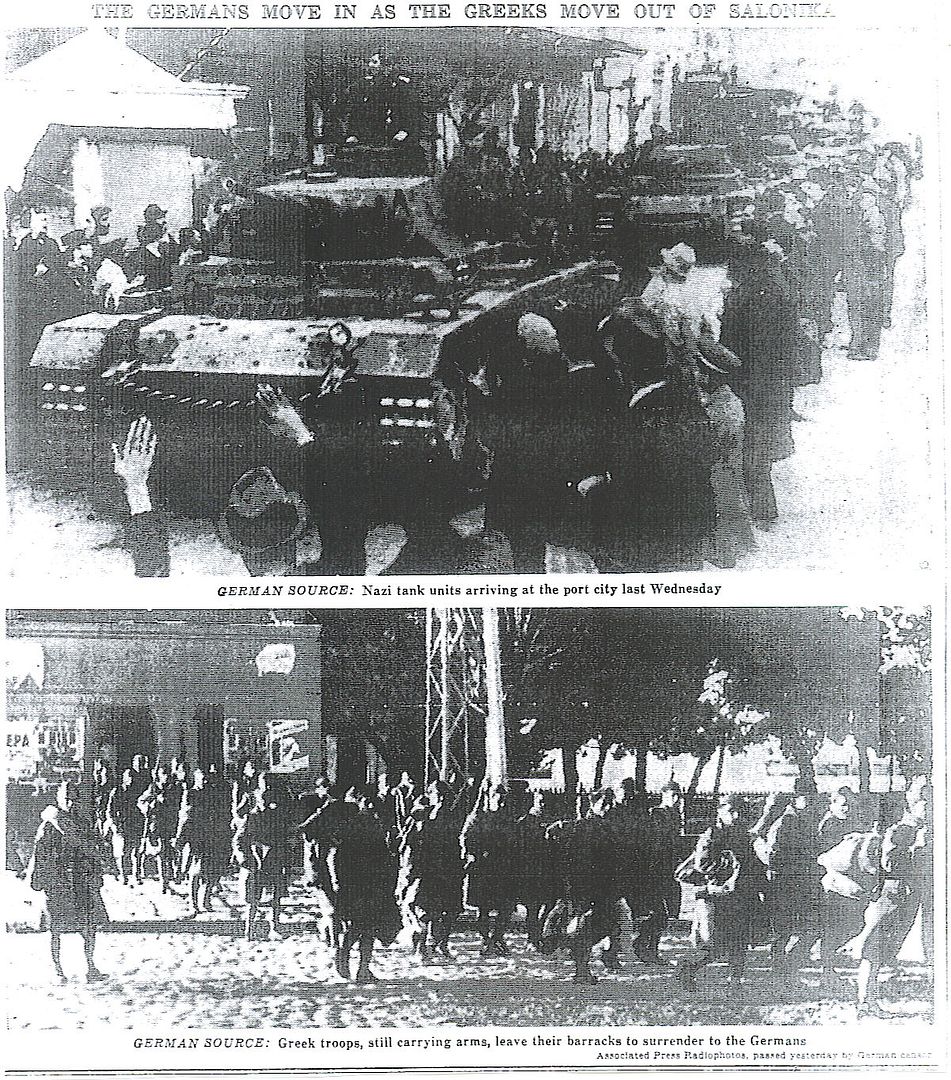
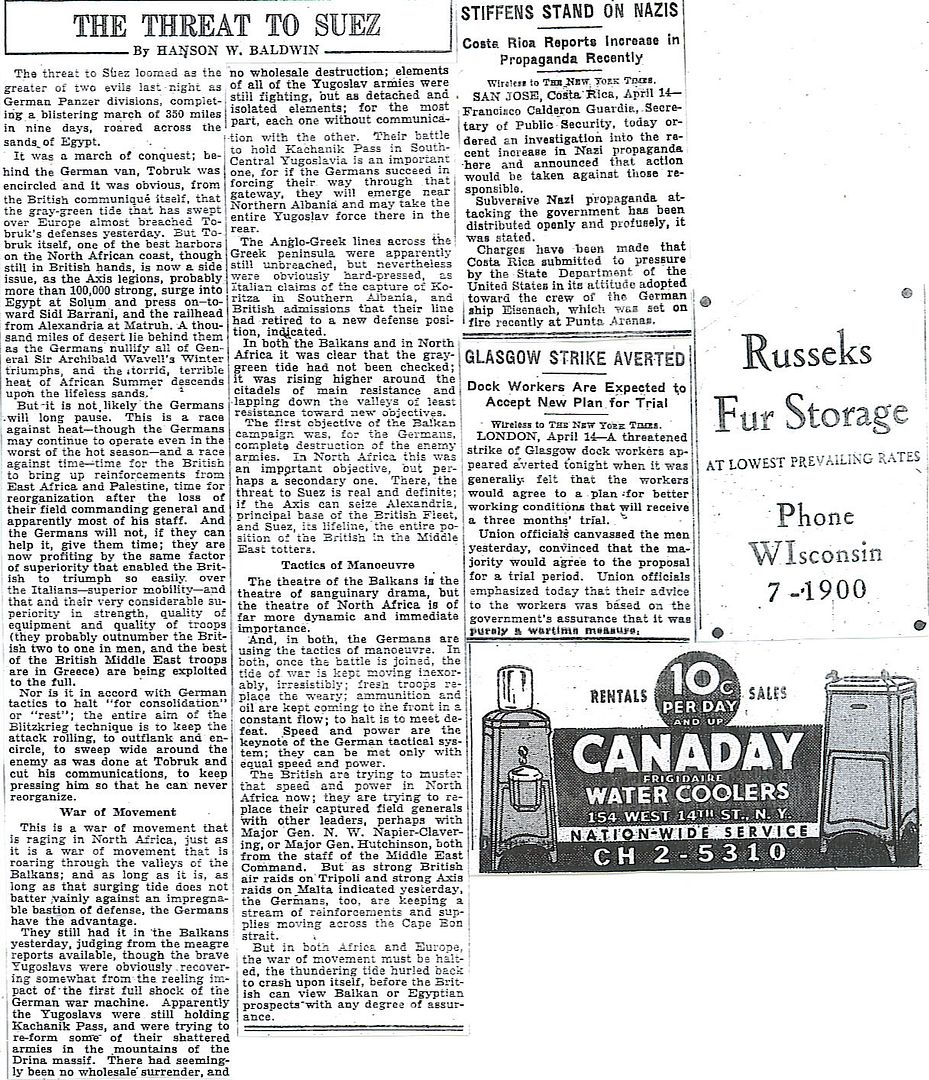
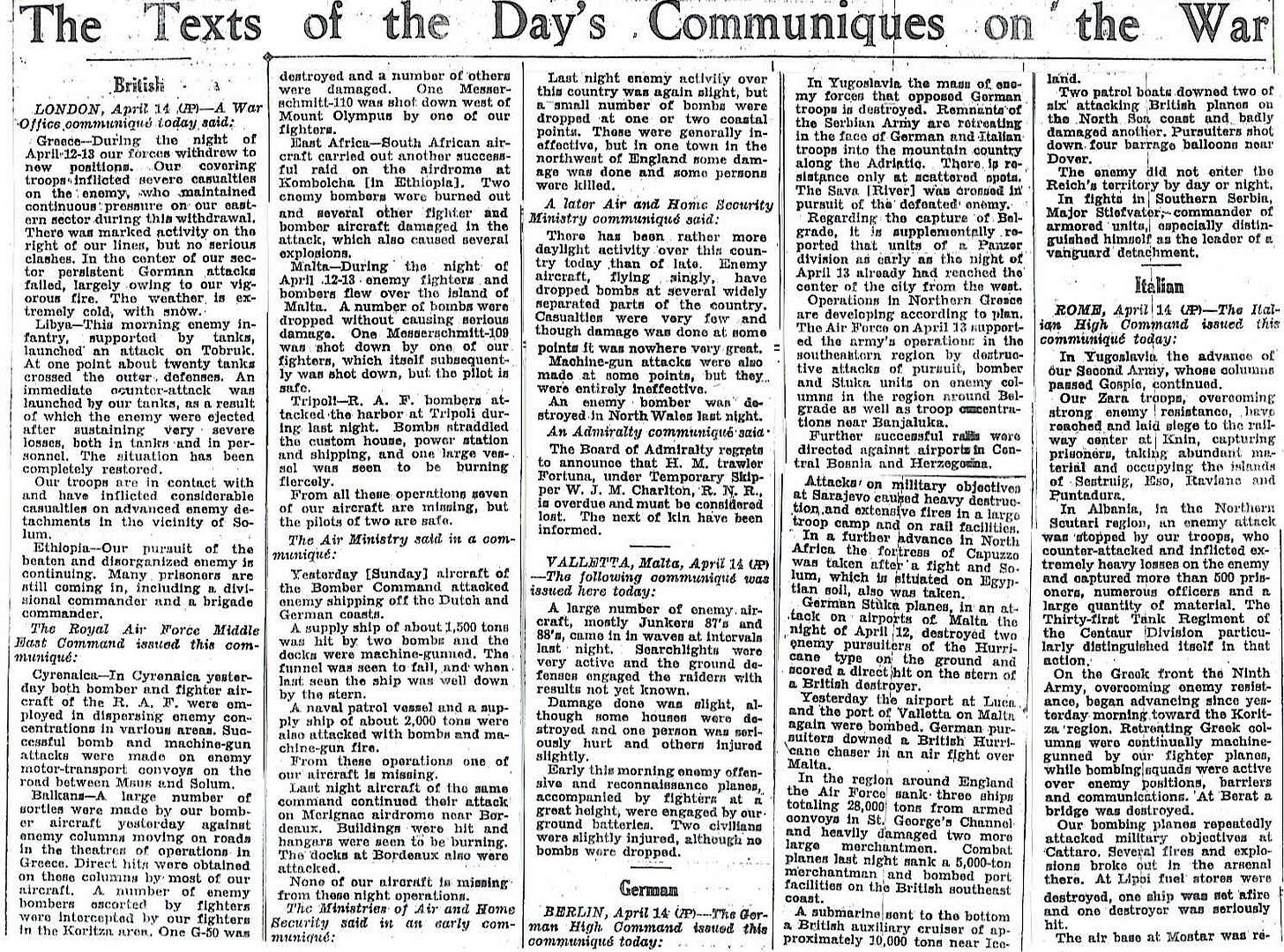
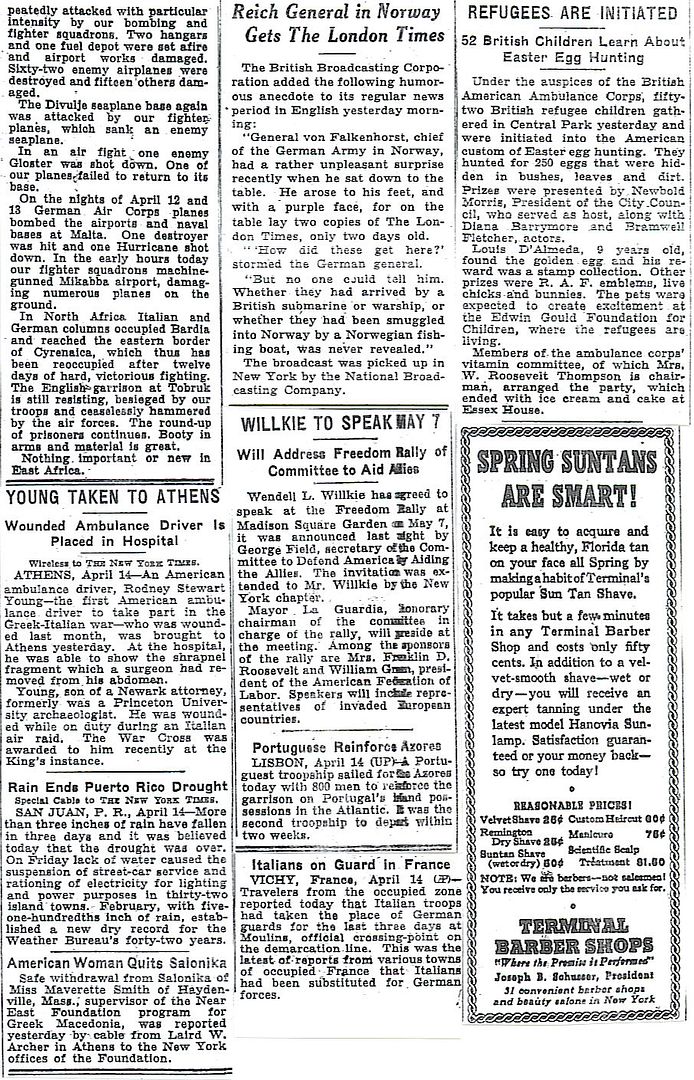
http://www.onwar.com/chrono/1941/apr41/f15apr41.htm
Defenders of Tobruk holding on
Tuesday, April 15, 1941 www.onwar.com
In North Africa... German-Italian attacks on Tobruk are held.
In Washington... Harry Hopkins is appointed to be Roosevelt’s personal representative in charge of running the Lend-Lease program.
In Yugoslavia... The Simovic government flees to Athens.
From London... RAF Coastal Command is brought under the operational control of the Admiralty which will lead to an increase in its effectiveness in the battle against the U-boats.
http://homepage.ntlworld.com/andrew.etherington/month/thismonth/15.htm
April 15th, 1941
UNITED KINGDOM: Ulster: In Belfast heavy air raid kills 758 people and seriously injures 454. Another 15 people were killed in Londonderry and 5 in Bangor. Among the targets hit were the Harland and Wolff shipyard and York Road railway station. Parachute mines devastated working-class areas of north and west Belfast. The government is being criticised for leaving the city defenceless; there were only 16 heavy anti-aircraft guns in Belfast. The Ulster security minister has called Dublin and requested help. In a violation of neutrality laws, (Irish Prime Minister Eamon) de Valera ordered that all but one of the Dublin fire engines plus fire equipment from Dun Laoghaire, Drogheda and Dundalk be sent to Belfast to fight the fires.
RAF Bomber Command: 2 Group: Low-level intruder strikes are carried out on Borkum by Blenheims of 105 Sqn. During other anti-shipping strikes two vessels are sunk.
London:
The American United Press News Agency reports:
London officials categorically deny the rumours circulating in Berlin that the British are thinking of withdrawing their troops from Greece.
POLAND: A German reconnaissance plane makes an emergency landing at Rovno, in Soviet-held eastern Poland. It was on a mission in preparation for Operation Barbarossa, but the crew are allowed to return to Germany and the plane followed shortly. While waiting to return to Germany the crew are allowed free movement at the Soviet military airfield.
EGYPT: Cairo: de Gaulle presses Wavell to agree to a Free French plan for entering Syria from northern Palestine and asks for British assistance in the form of air cover, tanks and transport. Wavell refuses as he needs all his forces in other theatres. Wavell and other senior British Middle East commanders meet and decide that the evacuation of all forces from the Greek mainland is unavoidable.
Cairo: General Wavell’s Headquarter’s announced:
The Germans are carrying out an offensive in Cyrenaica using heavy and medium tanks supported by large numbers of mobile motorised batteries. The German troops bypassed Tobruk, and later Sollum, which was attacked from the east.
BULGARIA: Bulgaria severs diplomatic relations with Yugoslavia.
U.S.A.: Harry Hopkins is appointed as President Roosevelt’s personal representative over the Lend Lease Program.
U.S. President Franklin D. Roosevelt signs an executive order permitting members of the US Army Air Corps, US Marine Corps and US Navy to sign one-year contracts with the Central Aircraft Manufacturing Company (CAMCO) in China. After the one year term, these personnel will be permitted to rejoin their respective branch of the military without loss of rank. This is the first step in forming the American Volunteer Group (AVG), aka, “The Flying Tigers,” in China. (Jack McKillop)
The Truman Committee, of the US Senate, holds their first hearing. Appearances include Henry Stimson and General George Marshall. While discussing the problem of seniority in the Army, Marshall insists on the need for selective promotion. “You give a good leader very little and he will succeed, you give a mediocrity a great deal and he will fail.” This marks the beginning of a long relationship between Harry Truman and George Marshall. (From David McCullough — “Truman”)
COMMONWEALTH OF THE PHILIPPINES: Brigadier General Edwin “Pa” Watson writes to MacArthur that Roosevelt wishes him to remain in “a military capacity” in the Philippines. (Marc Small)
GREECE: The government of Yugoslavia moves to Athens. They join King Peter.
Blamey is issued with the order to withdraw the ANZAC Corps to the Thermopylae/Corinth line.
Blamey’s orders for the withdrawal provided that the 6th NZ Brigade would occupy a rearguard position astride the roads near Elasson through which the two forward New Zealand Brigades would withdraw; the 16th Australian Brigade would occupy a position west of Larisa through which the 17th Australian Brigade would withdraw and the 19th Australian Brigade would form a final rearguard at Domokos. Meanwhile German divisions were rushing south and west over muddy cratered roads. Blamey ordered Brigadier Allen’s 16th Brigade to the Pinios Gorge to halt the German thrust towards the main road at Larisa, a bottle-neck which was the only escape road for the Anzac Corps. (Anthony Staunton)
Day 593 April 15, 1941
In Greece, Luftwaffe bombs RAF airstrip at Larisa at dawn, destroying 10 Blenheims on the ground. Luftwaffe has command of the air and RAF aircraft are withdrawn to Athens. Leibstandarte SS Regiment cuts the road to Greneva, blocking the retreat of the Greek Army of Epirus from Albania. This exposes the flank of the Allied line from Mount Olympus inland. At 10AM, British General Wilson orders a retreat 80 miles South to the Thermopylae line, yielding all of Northern Greece but protecting the capital Athens on the peninsula of Attica. ANZAC troops will hold the Mount Olympus line for a few days to cover the retreat of the mobile Allied forces but the Greek Army (which is still North of this line and moving on foot) will be abandoned. British Admiral Cunningham begins planning an evacuation from Greece.
Resistance in Yugoslavia is more or less over. Yugoslav 2nd Army, holding Sarajevo, capitulates as 2 Panzer Divisions enter the city simultaneously. Other Yugoslav units have withdrawn into mountainous areas in the West of the country. Croatian fascist leader Ante Pavelić returns to Zagreb to set up the Independent State of Croatia in collaboration with Nazi Germany.
Tobruk. Despite yesterday’s setbacks, Rommel presses his attack on the Allied defensive perimeter. At 5.30 PM, 1000 Italian infantry move forward, cut the wire and capture one of the machinegun posts. The usual combination of Australian small arms fire from neighbouring posts and British artillery fire wreaks havoc with the Italians who withdraw at 6.15 (leaving 250 dead and 113 POWs).
Italian submarine Tazzoli sinks British SS Aurillac 500 miles West of Lisbon, Portugal (1 killed).
From 11 PM to 5 AM, 200 Luftwaffe bombers drop 203 tons of high explosive bombs, 80 parachute mines and 800 incendiary canisters on Belfast, Northern Ireland. 900 civilians are killed, 1,500 injured and 56,000 homes (half of the houses in Belfast) are damaged leaving 100,000 homeless. Vounteer fire crews from Ireland cross the border to assist and stay 3 days.
I just started reading and was taken aback by the very first article.
“British forces along the Allied line in Greece have been forced to “withdraw to new positions” after defeating with heavy enemy casualties a crack division of German Schutzstaffel troops”.
I’m not familiar with this tactic of retreating when you win. Must be another “line correction”.
This actually reminds me of an interview with Donnie Allison many years ago when he was asked about the fight that he got into with Cale Yarborough at the Daytona 500.
“Cale repeatedly hit my fist with his face.”
I see Rommel is mentioned for only the second time since the Afrika Korps began marching across Libya. Still just a mention of him being in command and no real detail.
And at this point in time, the LEIBSTANDARTE was a regiment, not a division.
The report from Berlin on page 8 has a more believable ring to it. This could be a pattern. Since the side coming out on top has more reason to be happy with the reality of the situation, their releases are more likely to be factual. The losing side is more likely to engage in denial.
"The campaign in Greece is proceeding according to plan. But enough on the Balkans. Let's talk about East Africa . . ."
I think you are right. Remember back during the Battle of Britain that even on the bad days the British were soundly inflicting heavy losses on the Germans.
Note the picture of the Greek civilians saluting their liberators. And the Greek soldiers surrendering without a fight.
Disclaimer: Opinions posted on Free Republic are those of the individual posters and do not necessarily represent the opinion of Free Republic or its management. All materials posted herein are protected by copyright law and the exemption for fair use of copyrighted works.